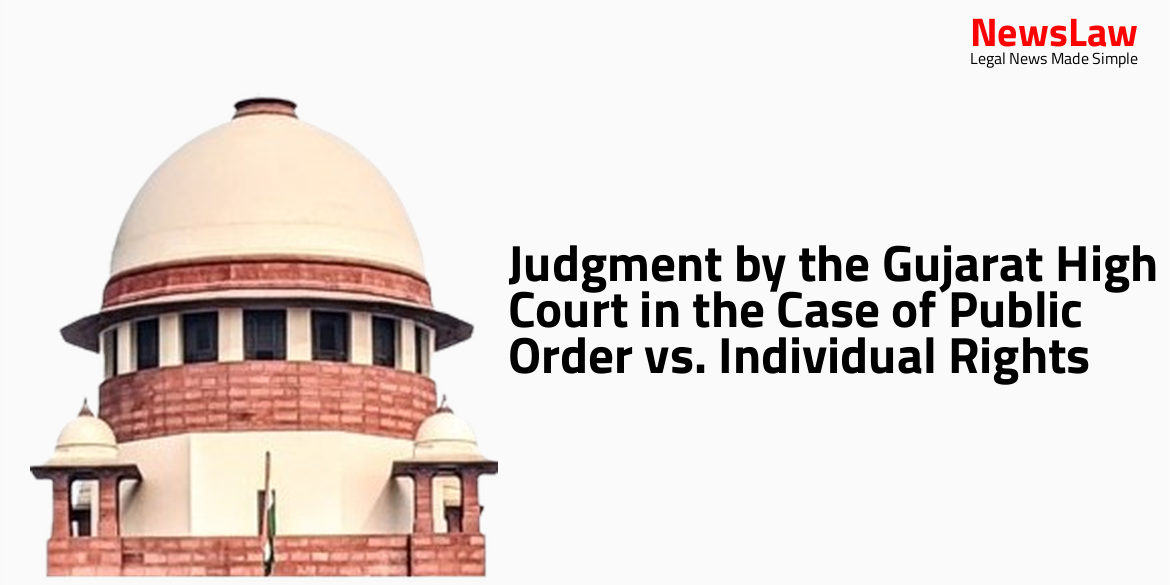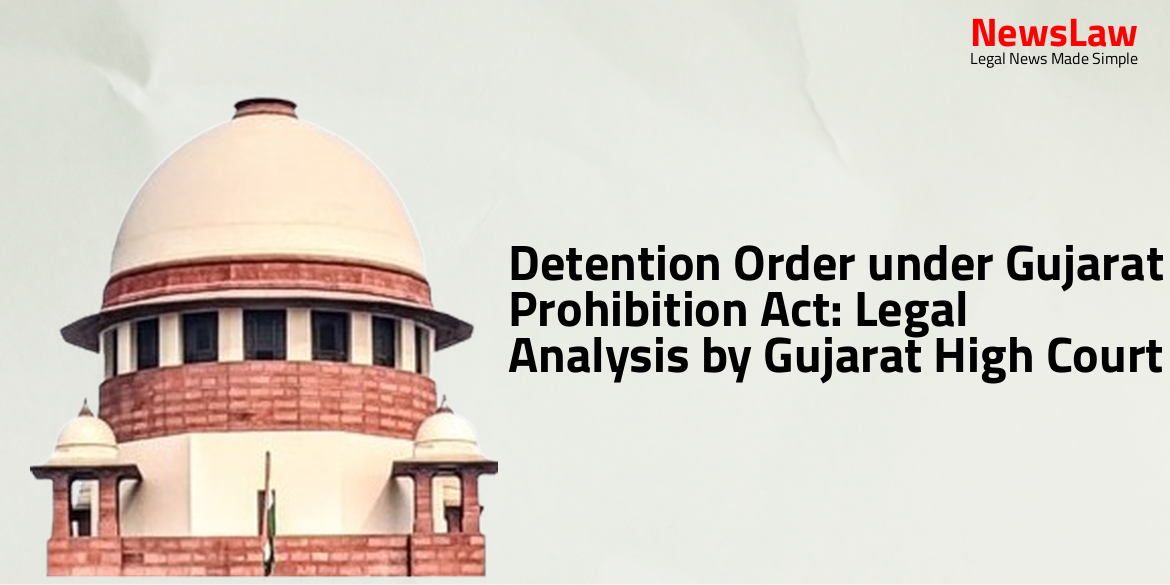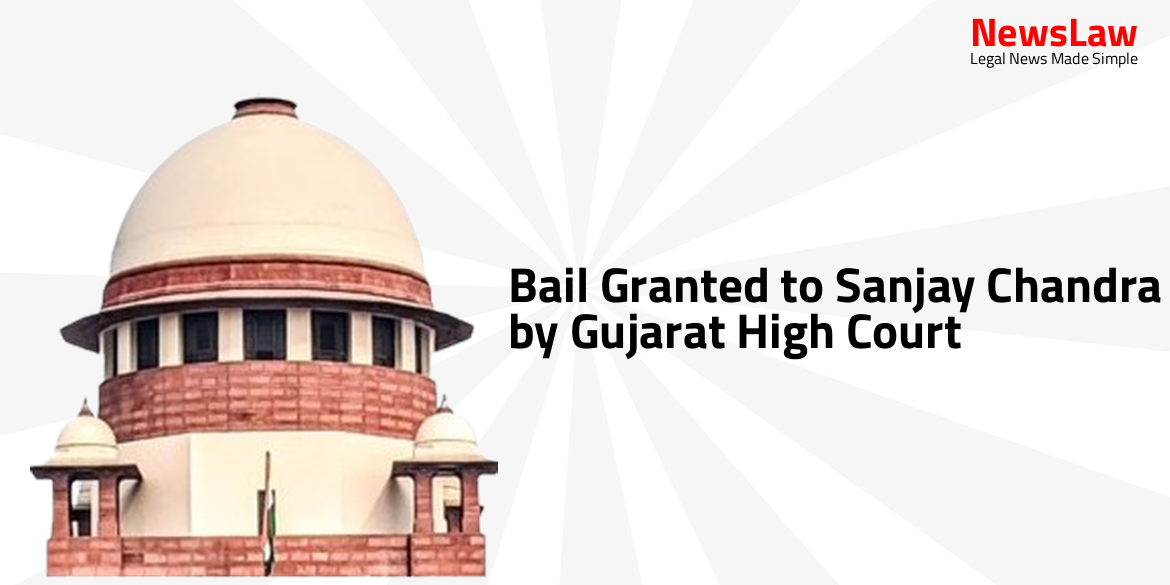In a significant ruling, the Gujarat High Court has delivered a judgment in the case of Public Order vs. Individual Rights, emphasizing the primacy of personal liberty protected under Article 21 of the Constitution. The Court set aside the detention order dated 06.01.2024, highlighting the importance of maintaining the delicate balance between upholding public order and safeguarding individual rights.
Facts
- The present petition challenges the detention order dated 06.01.2024 by the detaining authority under the Gujarat Prevention of Anti-Social Activities Act, 1985.
- The petitioner, as defined under the Act, has been detained under Section 3(1) of the Act.
- The petitioner has filed the present petition against the order of detention.
- The grounds for detaining the petitioner are based on anti-social activities as per the provisions of the Act.
Arguments
- Petitioner’s advocate argues that detenue’s activities do not disturb public order but rather amount to breaches of law and order.
- No substantial evidence beyond FIR registrations to suggest detenue’s actions are a threat to public order.
- Detaining authority failed to consider that detenue was granted bail in all offenses.
- State’s stance is that sufficient evidence during investigation shows detenue’s habitual engagement in activities defined by the Act.
- Court observes that detaining authority’s satisfaction lacks legality as alleged offenses do not impact public order and can be addressed by existing laws.
- Petitioner’s advocate asserts that detention order solely relies on three FIRs which do not establish a threat to public order.
- Petitioner seeks quashing of detention order based on FIRs related to specific sections of penal codes and police act.
Analysis
- The detaining authority did not consider the material circumstances properly.
- The two FIRs against the detenu could be handled through normal criminal law processes.
- Preventive detention is only for a year and should not be used to prolong custody without trial.
- Preventive detention should not replace ordinary law enforcement.
- No evidence shows the detenu posed a danger to public order.
- The detaining order did not mention any application for bail cancellation.
- Apex Court cases clarify the principles of preventive detention.
- The State has been granted the power to curb rights under criminal laws and preventive detention laws, to be exercised with caution and based on the impact on the state and its citizens.
- Preventive detention should not be used as a remedy if punishment under existing laws is sufficient.
- Freedom of individuals is supreme and cannot be restricted unless extremely necessary for ‘public order’.
- The distinction between ‘law and order’ and ‘public order’ is crucial; every breach of peace does not lead to public disorder.
- Preventive detention laws have strict constitutional safeguards to prevent abuse of power.
- The power of preventive detention should not be used as a substitute for ordinary law enforcement and investigative procedures.
- Detaining a person under preventive detention is to prevent them from committing specific offenses, not to keep them indefinitely in custody without trial.
- The concept of ‘public order’ must involve disturbance to the community at large, not just individual acts of disorder.
- Recent cases have highlighted the misuse of preventive detention laws in the State of Telangana, leading to a significant number of detention orders being revoked.
- The Apex Court emphasized the need for fair evaluation of detention orders against lawful standards and advised the State to review pending cases.
- Simplicitor registration of FIR/s does not have a nexus with the breach of maintenance of public order.
- Authority cannot have recourse under the Act without relevant and cogent material.
- Personal liberty protected under Article 21 is sacrosanct and high in the scale of constitutional values.
- Detaining authority must show that the detention aligns with the established procedure.
- Article 22 must be seen as an exception to Article 21 and can apply only in rare cases.
Decision
- The present petition has been allowed.
- The impugned order of detention dated 06.01.2024 has been quashed and set aside.
- The petitioner, who is the detenue, is ordered to be set at liberty forthwith, unless required in any other case.
- The Rule made is absolute to the extent mentioned.
- Direct service is permitted in this case.
Case Title: JAGDISH @ SHAMBHU S/O KIRANBHAI WAGH Vs. STATE OF GUJARAT
Case Number: R/SCA/1721/2024



